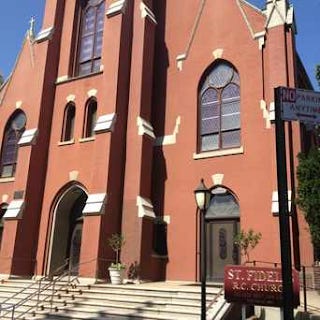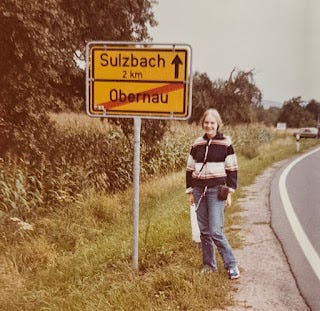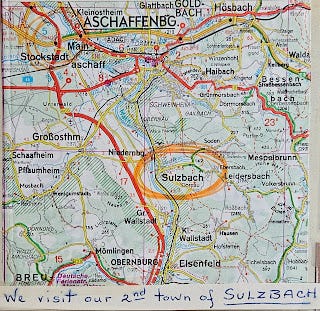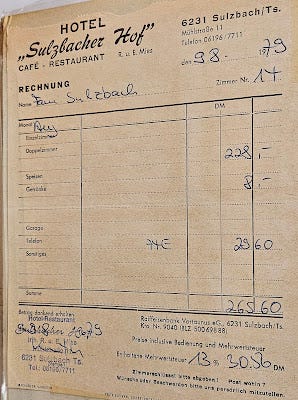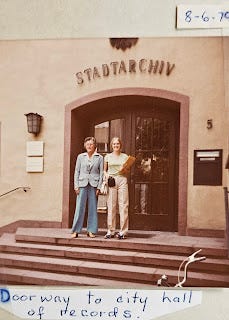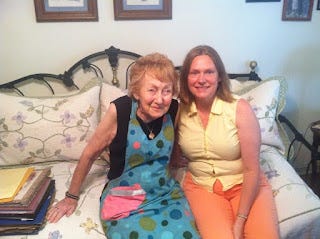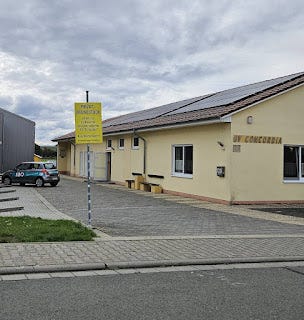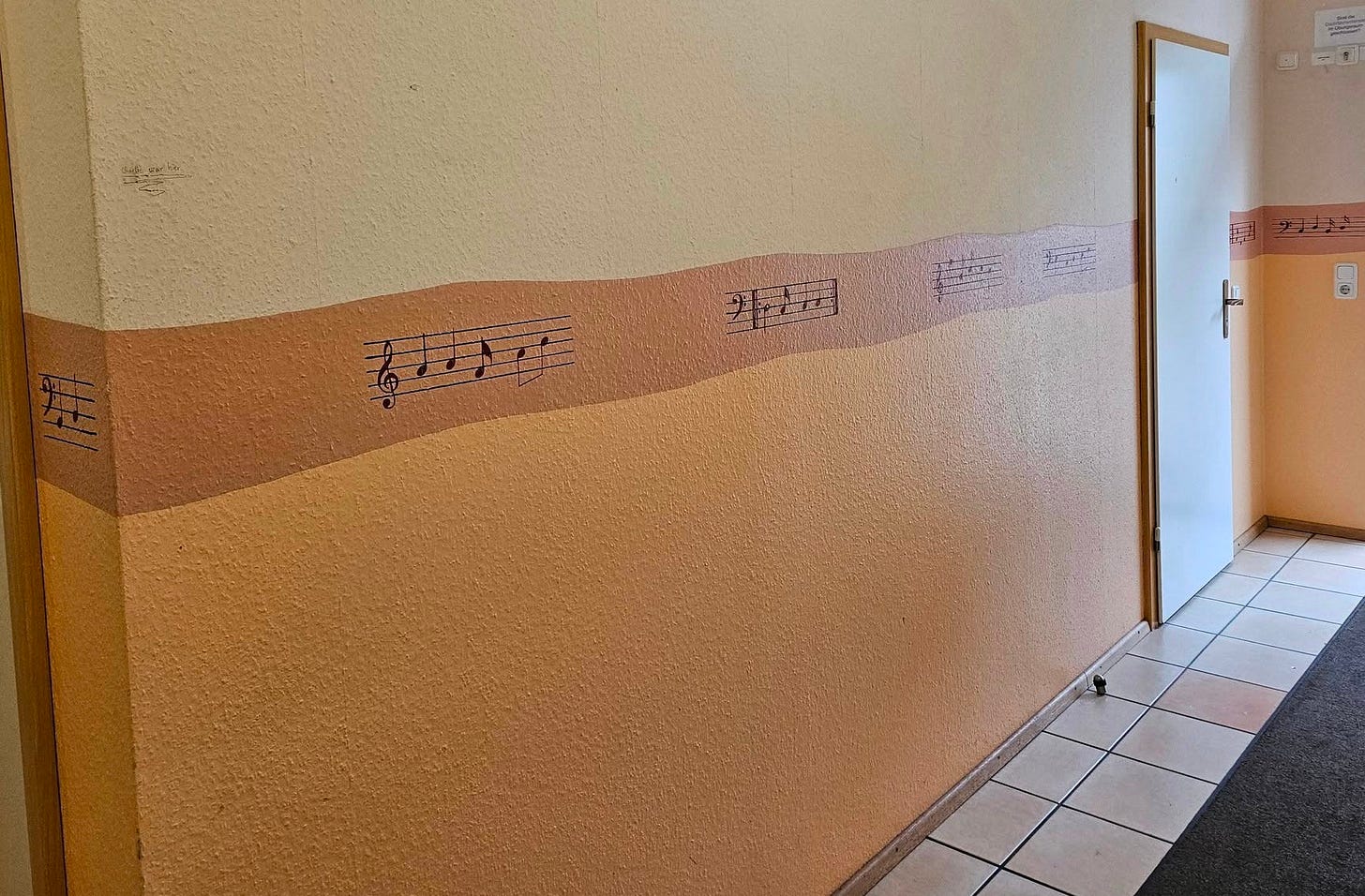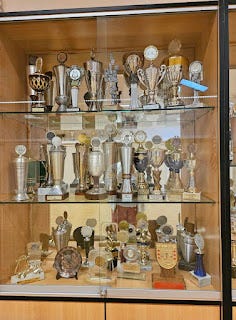Genealogy Matters Storyteller Tuesday Challenge: BRICK BUSTER
What a difficult choice! So many brick walls, so many busted. After looking over my stories, I chose the one with the most unbelievable bust.
Growing up, I heard the story of How-our-Family-got-to-America many times from my cousin Ann Smith. Exuberance and familial feeling were her strong points; accuracy was not. However, as a kid, I had no reason to doubt her, especially because the story was consistent down to the exact wording. It goes this way:
Our family, the Sulzbachs, came from the town of Sulzbach in Germany. Our grandfather Pop Jake's father was a teacher, a musician, and a dreamer, who had no head for business. Pop Jake's mother came from a wealthy family, and her father had been a burgermeister of Frankfurt, where Pop Jake was born. (A burgermeister is the equivalent of mayor). Pop Jake's father lost all his wife's considerable money on bad investments. When she found out, Pop Jake's mother was very mad, and so was her whole burgermeister family. She told Pop Jake's father that she never wanted to see him again.
At the same time, Pop Jake was about to be drafted into the military. So he, his father, and a priest named Father Huber all came together from Germany to America to found the town of College Point, Long Island.
Well, these stories have a lot of facts, so as a teenager I set about proving them. I learned that College Point was actually settled in 1645 and named after a college built in 1838, and the "founder" was Conrad Poppenhusen in the 1850s. No mention of Father Huber or Mr. Sulzbach anywhere.
Poppenhusen Institute, College Point
The passenger lists show that Pop Jake and his father, whom I learned was also named Jacob, arrived 8 years apart. Jacob Sr., a schoolmaster, arrived when his son was 10. Eight years later, Pop Jake immigrated. Both Jacobs traveled alone, no Father Huber. I threw everything Ann said out the window.
But the moral is, throwing out these family stories is just as bad an idea as believing them wholesale.
Pop Jake and his father did live together in a boarding house in College Point in 1880, which did list Mr. Sulzbach as a teacher.
In my father's papers, I found a 100th anniversary book of the founding of St. Fidelis Roman Catholic Church. There was a Father Huber! and he had founded St. Fidelis in 1856. He ran the parish for German-speaking immigrants for 30 years and was a revered figure buried at the church building. I began to see --- Catholics at the time, like most immigrants, lived in their own communities where they didn't have to mingle with outsiders. This was the Church's answer to life outside Europe where there was no state religion and they would have to co-exist with others. They went to Catholic schools, lived by Catholic neighbors, and socialized at church functions. To Ann as a child, St. Fidelis was the whole town, and Father Huber had founded it.
St. Fidelis today
But Mr. Sulzbach was only mentioned in passing as an early Sunday School teacher. However, I found an obituary showing that Jacob Sr. lived with Pop Jake and was a music teacher at St. Fidelis School. Musician.
Brooklyn Daily Eagle, 8 April 1897
When I was 14, I saw Roots on TV and knew that I wanted to do that too. Trace my family back to the Old Country and write a book about it. So when I was 15, my mother gave me a genealogical research trip to Germany as an early graduation present.
Here are my mother and I at Sulzbach am Taunus on the way to the Hotel Sulzbacher Hof.
me leaving Obernau, Sulzbach am Main 2 km ahead
We were going on scant knowledge of my father's family - my grandfather Jacob Sulzbach's birthdate and place, 1861 in Frankfurt, his emigration about age 18, their Roman Catholic religion, and the family's namesake hometown of Sulzbach. Oh yes, and his maternal grandfather, name unknown, had been a burgermeister (mayor) of Frankfurt. I had done research on my mother's Canada family the year before and it was fairly easy. So we thought our scant knowledge was enough - and we thought it was accurate.
We were so so wrong.
Sulzbach am Main in Bavaria
The first thing we discovered was that there are 5 towns named Sulzbach. We chose Sulzbach am Taunus - it was as good as any - and stayed at the Sulzbacher Hof (Sulzbach Hotel).
our bill made out to "Frau Sulzbach"
From there we took the train into Frankfurt - the 5th largest city in Germany - and applied for help from some important government official who didn't speak English and his assistant who did. My cousin Ann spoke to this important man exuberantly in her homespun Brooklyn-accented German, not the polite high German his rank required. I spoke to him in my schoolgirl German, shy but proper. Either way, we found nothing. No birth record, no burgermeister, no emigration. The assistant suggested maybe Pop Jake was born in a shiptown, which after a few tries I realized was township.
my Sulzbach cousin Ann Smith and I at the City Archives
So I gave up for the next 15 years, went to college, got married, had kids....and when the Internet arrived and it became possible to research an hour here and 10 minutes there, corresponding with relatives I never heard of and keeping it all on the computer, I did US research. I crafted a fair picture of immigrant life in New York. It showed how the strains of the family dissipated throughout the states and became lost to one another, leaving snippets of clues, each person with a different piece of the puzzle.
Here is the incredible part:
Another decade went by. Completely out of the blue, my mother got a phone call from a man in Germany, in Rockenberg. He called her because she was the only Sulzbach in a New York phone book, and he was looking for descendants of a Jacob Sulzbach who had come to America 130 years before. This man was a teacher, a musician, and a dreamer -- he had founded a chorus called Concordia 150 years ago. The man on the phone was in charge of its anniversary celebration, and he thought it would be great if he could find a descendant. Yes, my mother knew a Jacob Sulzbach. He was her grandfather-in-law.
My mother gave him my info, and we had a breath-taking conversation. I wrote it all down - the Sulzbachs had lived in Rockenberg for centuries, the Concordia performed all over Europe, Jacob the Founder was revered even today. The following week my husband died, and when I regained consciousness a decade later, I had no idea where those notes might be.
Me with my long-lost Cousin Betty, at the Sulzbach Family Reunion 2014
More years passed. Long-lost Sulzbach cousins and I found each other over Ancestry and we met at a family reunion half-way across the country. We were filling in blank spaces in a painting, but our information was as contradictory as it was complementary.
The home city wasn't Frankfurt but Mainz - the middle names were different - Jacob was a musician? no, a Catholic professor - he had come to America at least once before he settled - his motivation was money?, no, politics and missionary zeal - Catholics were persecuted when Germany unified - they knew his wife's name - why hadn't she come too?
The Sulzbach cousins and I put all our knowledge together to come up with a vibrant portrait of our immigration story.
Now I'm 60 and my daughter is 30. For that milestone, she wanted us to go to a genuine Oktoberfest. Once landing in Frankfurt, I felt drawn to take a spare day and see the town I couldn't find 45 years before. Under gray skies that made the warm air look cold, we followed the highway to Rockenberg. The town was so small I missed the sign and we were through it before I realized. So we drove back along the narrow angled streets with houses rising sharply from the sidewalk, prompting a horn blast when we rested too long at a stop sign. There were several posters of the Concordia bringing color to the solid square houses, and we pulled over to examine one. An address!
A few simple turns brought us to the street. I had only wanted a photo outside the building, but the door was open!
The tears started to fizz up as I left the car and headed into this place I had sought for so long. A music-note frieze was painted along the wall as if to accompany us through the building. I ran my fingers along it, and the tears fell down my face.
On the left was a large empty room that looked like a chorus would meet there, so I entered and feasted my eyes on the 4 trophy cases and more trophies too big to fit. All the loving cups, small medium and large, gold silver and bronze, labeled 1st, 2nd, 3rd, and 4th Preiz. Faded ribbons with tassels. A cacophony of awards!
We did walk around after that, took pictures at the Rathaus, town hall.
Me on the Rathaus steps
In the park across the street a stone explained the old Rathaus had stood there for 300 years. That must have been where my legendary ancestor was the burgermeister, if true.
Translation: OPEN SQUARE AND OLD TOWN HALL
The old Rockenberg town hall stood at this location until 1847, a half-timbered building built around 1520. It was part of the Rockenberg village renewal in 2003.
2003! That’s when the anniversary planner had called a Sulzbach in a phone book and reached my mother. The Concordia celebration was part of a whole village event.
I posted on social media and my cousins want to come. Next time, we will attend a concert. Next time we will meet Sulzbachs. Next time we will see the house they lived in. Next time we will get to know Jacob the Founder. Next time, we will see a photo of him. Next time.
https://www.concordia-rockenberg.de/






